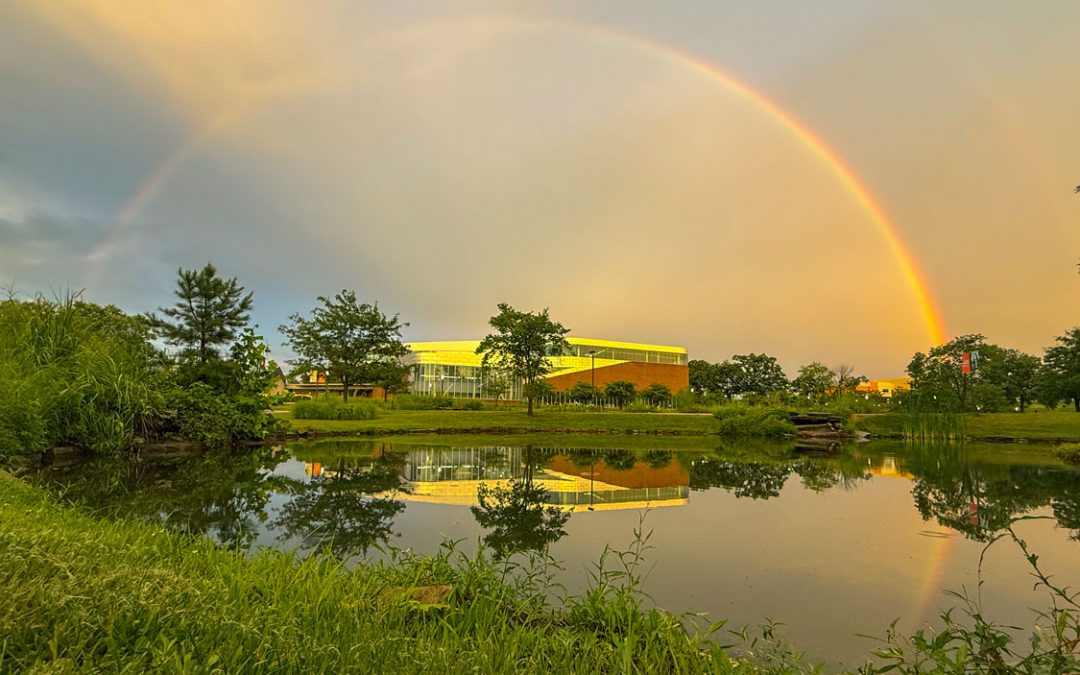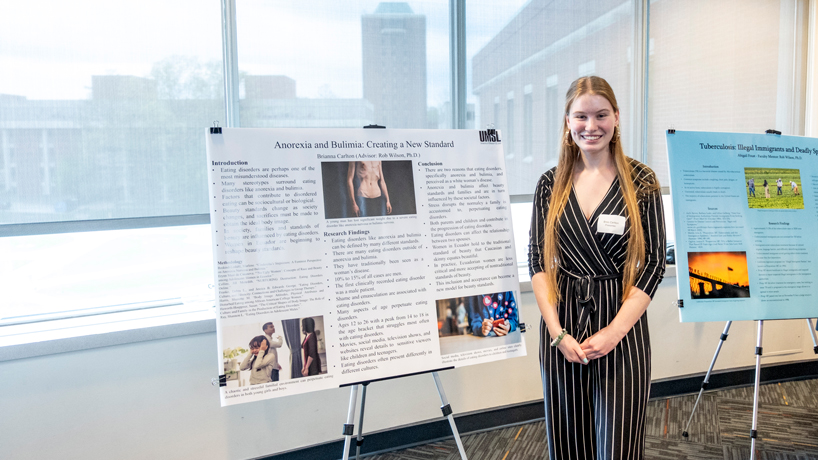
Sophomore Bree Carlton presents her project, “Eating Disorders: Creating a New Standard.” Carlton was one of 60 undergraduates who exhibited their original mentored investigations and creative inquiries during Friday’s Undergraduate Research Symposium at the University of Missouri–St. Louis. Students were eager to showcase their work and mingle with members of the UMSL community in person. (Photos by August Jennewein).
Friday afternoon, the Millennium Student Center was buzzing with activity as the Undergraduate Research Symposium returned to the University of Missouri–St. Louis campus.
The event was held virtually the past two years due to COVID-19 precautions, but this year, students were eager to present their work and mingle with members of the UMSL community in person.
The URS is a professional-style venue for undergraduates to present their original mentored investigations and creative inquiries to family members, faculty, students and staff. More than 40 projects were presented by about 60 students who were mentored by 20 faculty members.
The afternoon began with oral presentations in the MSC rooms and progressed to visual presentations on the third-floor rotunda. After the student presentations, there was a 30-minute panel discussion followed by a social hour and reception in the MSC Century Rooms.
The student projects ran the gamut, including topics such as: African musical instruments, bacteria outbreaks, eating disorders, film, food security, neighborhood sustainability, sex education, substance use and totalitarianism.
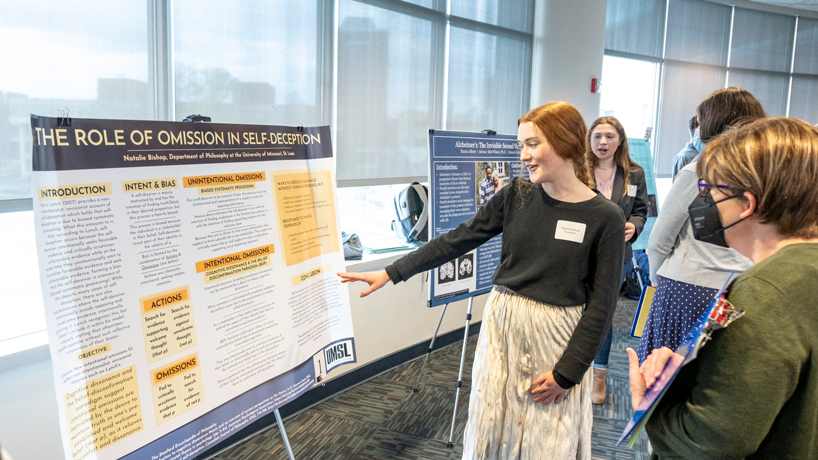
Natalie Bishop explains her project, “The Role of Omission in Self-Deception,” to an interested passerby. Bishop also delivered an oral presentation earlier in the day on death avoidance in Western culture.
Oral presentations included talks from the anthropology senior seminar, honors history and several independent projects. Shane Devine, Brandon Elliott and Keith Stephens presented their project, “A New Life for UMSL’s African Instrument Collection,” which examined how the university’s collection of West African instruments should be conserved in an effort to uphold the musical culture of the peoples associated with the instruments.
Joshua Heisel spoke on the legacies of two prominent Jewish Russian writers during “Vasily Grossman and Ilya Ehrenberg: Soviet Jews on the Nazis and Soviets.” He recounted lives and works of Grossman and Ehrenberg and their collective impact on the world’s perception of the Holocaust and Germany after World War II.
For her independent project, Natalie Bishop presented “Ignorance is Far from Authentic Bliss: Consequences on Death Avoidance in Western Culture.” Bishop contended that the avoidance of death in Western cultures restricts people’s ability to truly grieve and creates an environment where it’s difficult to view death in relation to one’s self.
“People must be allowed and encouraged to collectively confront death in their environments,” she said. “In non-Western cultures, death practices are much more rich and intricate, allowing for individuals to have a deeper experience and closure with their losses.”
To turn the tide against this avoidance, she advocated for “sheer presence,” or a willingness show up to funerals and be a part of the grieving process; familiarization with death education; and conversations about life, death and human suffering among peers at institutions such as the Ethical Society of St. Louis.
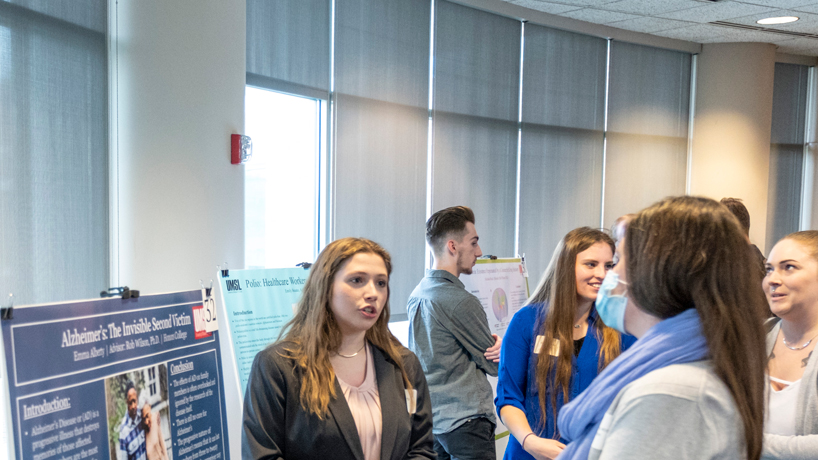
Freshman Emma Alberty (left) discusses her project, “Alzheimer’s: The Invisible Second Victim.” In the future, Alberty plans to attend medical school with the goal of studying neurology.
As for the visual presentations, students lined the third-floor rotunda with their exhibits and presented to interested passersby.
Sophomore Bree Carlton investigated eating disorders at a global level for her project, “Eating Disorders: Creating a New Standard.” Carlton was inspired to explore the topic because most research on the issue focuses on white women, but she wanted to take a broader view of eating disorders that includes men and women of color. After digging into the history of several diseases, she found some interesting surprises.
“I think something that’s really important is that first reported case of anorexia was a man,” Carlton said. “So, while we perceive it as this women’s disease, it didn’t start like that.”
She was happy to be able to share her work with the UMSL community.
“I think it’s really exciting,” she said. “Honestly, this day was really a lot to prepare for, but I’m glad that I did. I’m glad I put in the work, and I’m glad I’m here.”
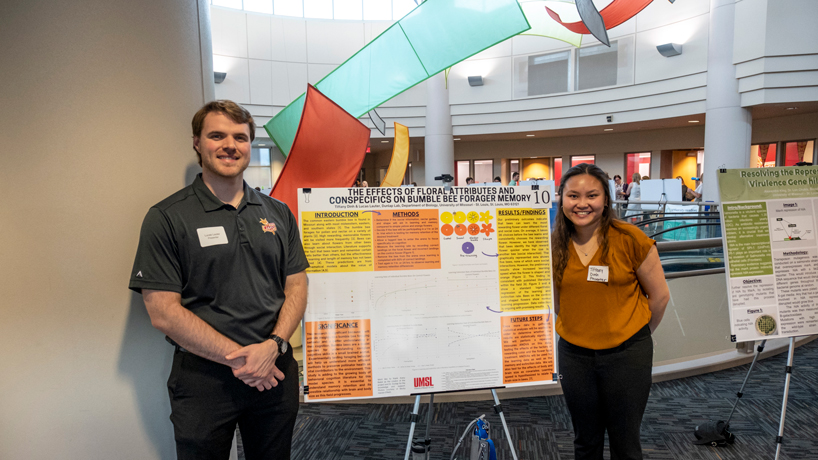
Seniors Tiffany Dinh and Lucas Lauter showcase their research on foraging bumble bees.
Seniors Tiffany Dinh and Lucas Lauter focused their research on foraging bumble bees. Their project, “The Effects of Floral Attributes and Conspecifics on Bumble Bee Forager Memory,” tested how long bees remember certain information about flowers in relation to how rewarding those flowers are.
“By rewarding, we mean the amount of good sugar that’s in it versus water,” Lauter said. “The reason we’re testing that is because there’s a little bit of a gap in the literature, where the memory retention was not looked at very well.”
Dinh added that the pair enjoyed sharing their work.
“I think it’s really exciting and rewarding to present this to others,” she said. “In the previous years, with COVID, we haven’t had the chance to do this in person. I think it’s a good experience for us to practice our public speaking skills.”
Freshman Emma Alberty developed a social story to detail how Alzheimer’s disease affects the family and caregivers of Alzheimer’s patients for her project, “Alzheimer’s: The Invisible Second Victim.” Alberty wanted to address the issue because she worked in a nursing home with an Alzheimer’s unit and regularly observed family members and caregivers. As a biochemistry major, she also plans to attend medical school with the goal of studying neurology.
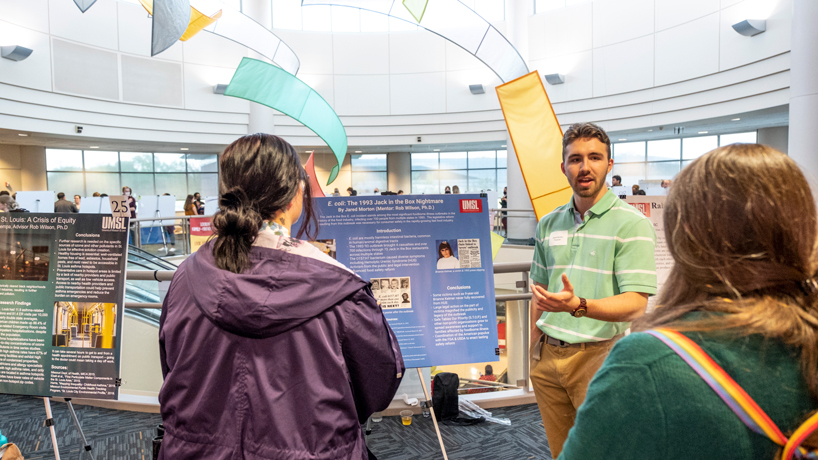
Senior Jared Morton talks to two attendees about his research on the 1993 Jack in the Box E. coli outbreak and the repercussions for food safety and the fast food industry.
The UMSL Graduate School also hosted the Graduate Research Fair on April 22 to showcase the work of 25 students. Judges presented monetary prizes to first-, second- and third-place winners in two categories: math, computer science and natural sciences and social sciences.
In the math, computer science and natural sciences category, Amanda Wu, a biology doctoral student, won first place for “Integrating Multiple Data Sources to Understand the Nature of an Endemic Species, the Maple-leaf Oak.” Melanie Shadrick, a chemistry doctoral student, finished second for “Defining the Scope of the Stereocontrolled α-galactosylation under Cooperative Catalysis,” while Lisa Snoderly-Foster, a biology doctoral student, place third for “Children with Sexual Behavior Problems: Ties to Child Maltreatment, Family Functioning, and Service Use.”
Kanila Brown, a psychology doctoral student, won the social science category with her project, “The Impact of Gender-neutral and Same-gender Normative Perceptions on Risky Behaviors among Young Adults.” Ann Thaiudom, a nursing doctoral student, won second for “The Effect of Self-Management Support Interventions for Adults with Mild Traumatic Brain Injury and Family Caregivers,” and Claudia Campbell, a psychology doctoral student, rounded out the top three with “Children with Sexual Behavior Problems: Ties to Child Maltreatment, Family Functioning, and Service Use.”
Graduate and undergraduate students alike were proud to take part in the events and exhibit their work for the UMSL community.
“It’s very interesting,” Alberty said. “I’m a freshman, so I feel really accomplished, being a freshman at the URS and being able to present research that I’m interested in.”












